21 Jun Celtic Druid History: Legacy and Influence
“One thing that comes out in myths is that at the bottom of the abyss comes the voice of salvation. The black moment is the moment when the real message of transformation is going to come. At the darkest moment comes the light.” – Joseph Campbell.
Celtic Druid History: Legacy and Influence
Previous posts in APOLLO’S RAVEN discussed Boudica’s revolt in 60-61 AD. She was probably the most famous Celtic warrior queen who led men and women warriors in their last major revolt against the Romans in Britain. Not only was she a charismatic leader, but she was also a druidess who summoned the Goddess of War, Andraste, to give her victory. Her spiritual connection and the uniting forces of the Druids were important factors that inspired warriors who had a penchant for individual glory to unite in this rebellion.
This article will explore the Druid’s influential role in the Celtic culture and their legacy of being magicians, judges, doctors, and diviners who created fear in Ancient Rome.
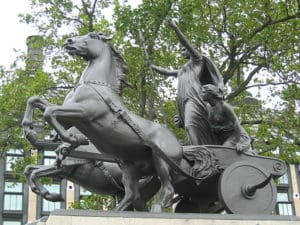
Statue of Boudicca
Introduction
Unfortunately, most historical accounts of Druids are biased through the foreign eyes of Greek and Roman historians. Irish and Welsh monks who wrote down Celtic mythology based on oral traditions were probably altered so the stories were more in line with their Christian beliefs.
Although Rome had precedence for tolerating religions in their conquered regions, Pliny the Elder (23 AD – AD) wrote, that under Tiberius, the Druids were suppressed—along with diviners and physicians—by a decree of the Senate. Claudius forbade their rites completely in AD 54. Druids were alleged to have performed human sacrifice, a practice abhorrent to the Romans. Pliny the Elder also writes: “It is beyond calculation how great is the debt owed to the Romans, who swept away the monstrous rites, in which to kill a man was the highest religious duty and for him to be eaten a passport to health.”
The more likely reason for the Roman decrees was the Druids’ influence on various tribes to organize revolts and to foster cultural beliefs that were contradictory to the monolithic structure of the patriarchal empire. The Romans looked upon women as bearers of children and objects of pleasure, while the Druid included women in their political and religious life. The Druids were the intelligentsia of the Celtic tribes who could have more power than kings in making decisions.
Despite Roman efforts to suppress the Druids’ practices, Celtic spiritual beliefs thrived in the form of mythical tales of chivalry, magic, and pantheon of gods and goddesses that showed their connection to nature. The Celts believed souls resurrect into other living beings. Their artwork and metal works reflect their philosophy that the physical and spiritual worlds interconnect, as shown in the imagery of a plant’s tendril gently stranding on itself, then spinning out into a pattern of whorls and fanciful animal shapes.
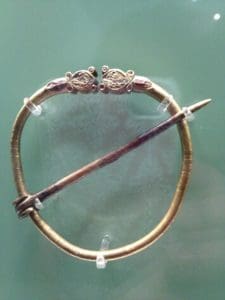
Celtic Broach Displayed at Bath Roman Baths
Through Greek Eyes
Strabo, a Greek geographer (64 BC – AD 44), classified three classes of men and women who held special honor in the Celtic culture: the Bards, the Vates, and the Druids. The Bards were singers and poets while the Vates interpreted sacrificial omens. The Druids studied the science of nature and moral philosophy. Strabo believed the Greek word Druidae was a cognate of the Greek drus, ‘an oak’. Some etymologists believed the word derived from the word roots drui-wid—’oak knowledge” — the wid meaning ‘to know’ or ‘to see’.
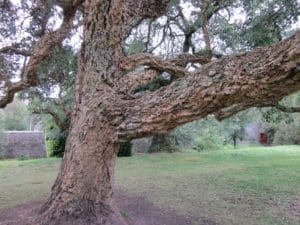
Cork Bark Oak South UK
Druids were believed to be the most just of men and were therefore entrusted with making decisions affecting either individuals or the public, often arbitrating between opponents in war. Druids pronounced that men’s souls and the universe are indestructible, although at times fire or water temporarily prevailed.
Diodorus Siculus (60 BC – 21 BC), a Greek historian, also used the same classification as Strabo’s, pointing out the Druids were held in the highest esteem. The Ovates foretold the future by the flight or cries of birds and slaughter of sacred animals.
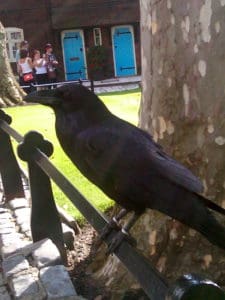
Raven at London Tower
Through Roman Eyes
Julius Caesar (100 BC – 44 BC), who had personal dealings with Celts in his conquest of Gaul, said there was three classes: the intellectuals (Druids), the military caste (Equites), and the common people (Plebs). Druids officiated at the worship of the gods, regulated public and private sacrifices, and gave rulings on all religious questions. Young people sought their instruction, as they were held in great honor by all of the people.
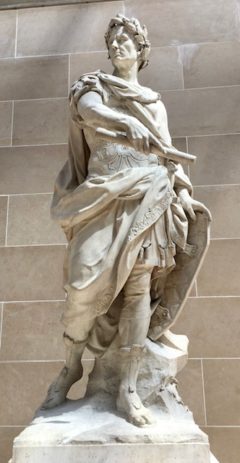
Statue of Julius Caesar at the Louvre Museum
The Druids were ruled under one head, whom they held in the highest respect. On his death, another outstanding individual replaced him if there was a consensus. If not, an election would be held to select the head or the final choice would be left to the winner of a final fight. Druids served as judges in most disputes, whether between tribes or between individuals and adjudicated any compensation to be paid in final judgments. Their decisions were final in all public and private matters. Anyone failing to accept their decision was banned from taking part in any sacrifice—the heaviest punishment that could be inflicted.
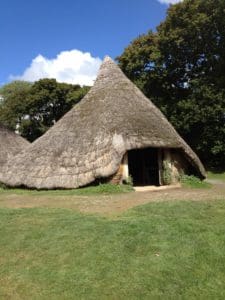
Celtic Round House for Assembly
Caesar asserted Druid doctrine was exported from Britain into Gaul. The Druids believed their religion forbade them to commit their teachings to writings as these could not be made public. Students had to memorize volumes of verse—many of them spending twenty years at their studies. It should be noted the Celts maintained written public and private accounts by using the Greek and Latin alphabets.
The most profound philosophy that Caesar highlighted was the belief that the soul does not perish, but after death passes from one body to another. According to him, the bravery of the Celts sprang from their lack of fear of death, the result of their belief that the soul does not die but is reincarnated after death.
Pliny the Elder (AD 23 – AD 79), who came from a family of Roman colonists in Gaul, described the Druids as natural scientists, doctors of medicine, and magicians. Perhaps it was Pliny’s fascination with magic that he recounted the anguinam, the ‘Druid’s eggs’ or ‘serpent’s eggs’. He said he possessed one of these eggs that looked like a crystal about the size of a moderately sized apple. The eggs were reportedly made by hissing snakes put together, the foam from their mouths producing a viscous slime which became a ball when tossed in the air and caught by a Druid who then used it to counteract incantations. The egg is a powerful image used in Celtic and other mythology.
To be Continued
The next posts will further explore Celtic mythology and religious believes.
References:
Peter Berresford Ellis, The Druids; Published in USA by William B. Eerdmans Publishing Company, Grand Rapids, MI; 1995.
Julius Caesar, translated by F. P. Long, The Conquest of Gaul; United States: Barnes & Noble, Inc., 2005.
Joseph Campbell, The Power of Myth with Bill Moyers; Printed in USA by First Anchor Books Edition, NY; 1991.
©Copyright June 21, 2014, by Linnea Tanner. ALL RIGHTS RESERVED.


Aquileana
Posted at 17:46h, 22 JuneHi Linnea,
Wonderful post as always…. Such an intersting read…
I liked very much thasst excerpt of Estrabo an the classes of men and women who held special honor in the Celtic culture
I have heard many times the word druid and Shakespeare is usually called The Bard… Now I know why…
Thanks for sharing. Best wishes,Aquileana 🙂
Linnea Tanner
Posted at 08:01h, 28 JuneHi Aquileana,
Thank you for your gracious comments and following. I love sharing our mutual interest in mythology. I also thoroughly enjoy your blog on Greek Mythology and Philosophy http://aquileana.wordpress.com/.
Best regards,
Linnea
Luciana
Posted at 06:10h, 26 JuneHi Linnea
Certainly know more about the Druids after reading your post. I knew druids had a great deal of power in Celtic society but it was interesting to read the POV from the Greeks and Romans. Also it reminds of the character Getafix from Asterix and Obelix by Goscinny and Uderzo LOL. Learnt lots from reading those comics ;D
Thank you for a informative and excellent post. Am loving the history on the Celts.
cheers
Luciana
Linnea Tanner
Posted at 07:50h, 28 JuneHi Luciana,
Thank you for your gracious comments. I’ve never heard of the characters from the comics. I’ll need to check it out. I’ve also loved your series of articles on various heroes and heroines from Homer’s Iliad on your blog http://luccav.com/
Cheers,
Linnea